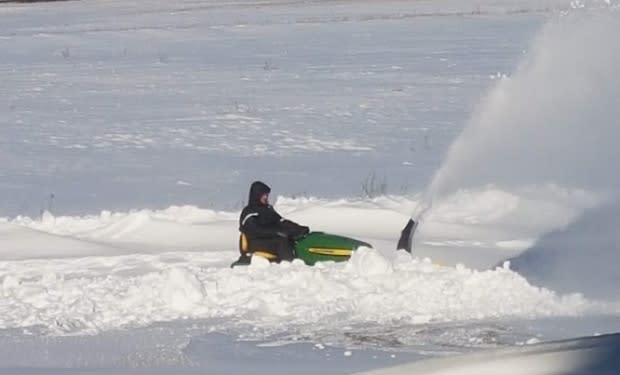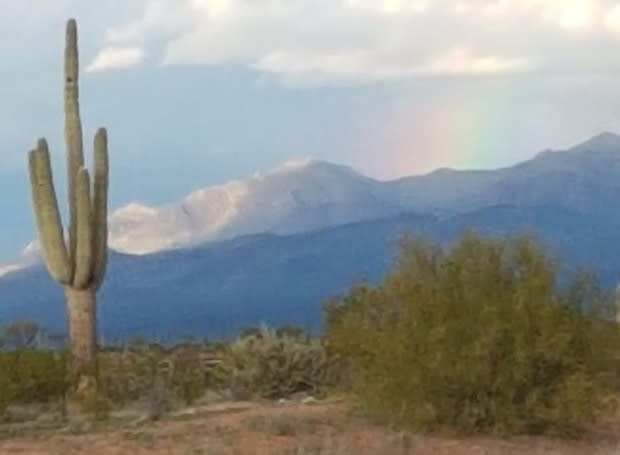P.E.I. snowbirds hope to travel to U.S. despite closed land border
Lorna and Donald Burns are remaining optimistic they will get to their Arizona home in the new year.
The retired couple are snowbirds — spending half of the year at their home in North Bedeque, P.E.I., and the other half in Mesa, Ariz. Despite land borders between Canada and the U.S. being closed to non-essential traffic until at least Oct. 21, they hope to travel to Arizona by air in January.
"We have been going there for five or six years in our RV, and then last November, we actually bought a mobile home in that park," said Lorna Burns.
"We're planning to go down and fly in and not do that long drive. Things are changing, or have changed, for us."
The couple usually leave for their age 55+ active living community in October and return in the spring. They have pushed their departure date to early January due to the pandemic, but also said they'll change their plans if needed.
Air travel OK
Despite the land border restrictions, Canadians have still been able to fly to the U.S. during the COVID-19 pandemic, though P.E.I.'s Chief Public Health Office does not recommend it.
"Non-essential travel outside of the Atlantic Bubble is still not recommended," said the office in an email to CBC News.
"Islanders should give very careful consideration before travelling to areas outside Canada where case counts are high with widespread community transmission."

According to Johns Hopkins University, the United States is still the hotspot for COVID-19 across the world with over seven million reported cases and over 200,000 deaths.
The Burns said they are following the events south of the border as they prepare to potentially travel.
"We're watching for border restrictions at the moment. California, Arizona and Florida have no requirements for self isolation, but that could change, and those states have had high incidences of COVID, so we watch for those things," Lorna said.
"If we had to self isolate, it wouldn't be a big deal"
No more repatriation flights
Canada's federal government is also not recommending non-essential travel at this time, but said the advice is not binding.
"If Canadians deem their travel essential and choose to travel despite these advisories, they should be aware that there may be other safety and security considerations that may impact them at their destination," said Global Affairs Canada in an email to CBC.
"The Government of Canada may have limited capacity to offer consular services."
Hopefully the figures, the numbers in Arizona ... will be better than they have been. — Lorna Burns
A spokesperson for Global Affairs said Canadians may have a hard time obtaining essential products and services — including medications — while abroad and may suddenly be subject to curfews, lockdowns and quarantines under their government at their destination.
Airlines may also suspend or reduce the number of flights without notice, making it difficult to return to Canada," the email said, adding that the Government of Canada is not planning additional repatriation flights, as it did in the spring when the pandemic first struck.
Global Affairs also recommends Canadians travellers contact their travel insurance provider and verify the terms, conditions, limitations, exclusions and requirements of their insurance policy before they leave the country.
Though they have yet to book a flight to Arizona, the Burns have already purchased their travel insurance through the Canadian Snowbird Association.

The association — which has more than 110,000 members — has said it's hard to gauge at this point what percentage of its members will actually head south this winter and that many are stuck in a holding pattern.
The Burns, and many of their Canadian and American friends who also travel to Arizona, consider themselves in this group.
"If we have to cancel for any reason, they will give us most of our money back, so we'll just wait and see how things go in January," Lorna said. "A lot can change."
'Might not be the same thing tomorrow'
Overall, Lorna said she believes the information provided by the governments to be clear if one knows where to look and takes the time to search it out.

"You have to kind of take responsibility yourself and search out the answers and realize that what happens today and what you hear today might not be the same thing tomorrow, so it's up to the individuals," she said.
"Hopefully the figures, the numbers in Arizona, in the greater Phoenix area, will be better than they have been, but again, it's something that we will assess."
In the meantime, Lorna and Donald intend to enjoy the Atlantic Bubble, travelling to Nova Scotia in a few weeks.
"We're hoping things will level off and settle down by January, if not, we'll have to make other plans," said Donald Burns.
"Staying home, shoveling snow, putting up with winter, not near as much fun."
More from CBC P.E.I.


